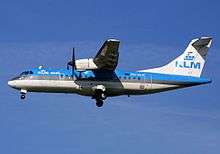Air Exel
Air Exel was an airline based in Maastricht in the Netherlands, operating scheduled and chartered flights out of Eindhoven Airport and Maastricht Aachen Airport to several domestic and international destinations.
| |||||||
| Founded | 26 April 1991 in co-operation with KLM | ||||||
|---|---|---|---|---|---|---|---|
| Ceased operations | 31 January 2005 | ||||||
| Hubs | Eindhoven Airport Maastricht Aachen Airport | ||||||
| Fleet size | 8 (in 2005) | ||||||
| Destinations | 10 (in 2005) | ||||||
| Headquarters | Maastricht, Limburg, Netherlands | ||||||
| Key people | Harm Prins (CEO) | ||||||
History

The airline was established on 26 April 1991 as KLM exel on a co-operational base with Dutch national carrier KLM. Scheduled flights were launched on 1 May of the same year. On 6 November 2004, the co-operation with KLM was ended, and the airline became Air Exel. One month later, in December 2004, Air Exel's Chief Executive Officer, Harm Prins, was arrested on charges of fraud, blackmail, and money laundering. The investigation brought to light financial difficulties with Air Exel, which was subsequently shut down on 31 January 2005.[1]
Destinations

Upon closure, Air Exel operated scheduled flights to the following destinations:
- France
- Nantes - Nantes Atlantique Airport
- Paris - Charles de Gaulle Airport
- Saint-Étienne - Saint-Étienne–Bouthéon Airport
- Strasbourg - Strasbourg International Airport
- Italy
- Cuneo - Cuneo International Airport
- Milan - Malpensa Airport
- Netherlands
- Amsterdam - Amsterdam Airport Schiphol
- Eindhoven - Eindhoven Airport secondary base
- Maastricht - Maastricht Aachen Airport main base
- Norway
- United Kingdom
- London - Stansted Airport
- Germany
Fleet
Over the years, the KLM Exel/Air Exel fleet consisted of the following aircraft types:[2]
| Aircraft | Introduced | Retired | Total (at closure) |
|---|---|---|---|
| ATR 42 | 1998 | 2005 | |
| ATR 72F (cargo) | 1999 | 2005 | |
| Embraer EMB 120 Brasilia | 1998 | 2005 | |
| Embraer ERJ 145 | 2000 | 2004 | |
References
- "Chief executive Air Exel arrested". 13 December 2004. Retrieved 15 July 2017.
- KLM Exel fleet list at airfleets.net
External links
| Wikimedia Commons has media related to Air Exel. |